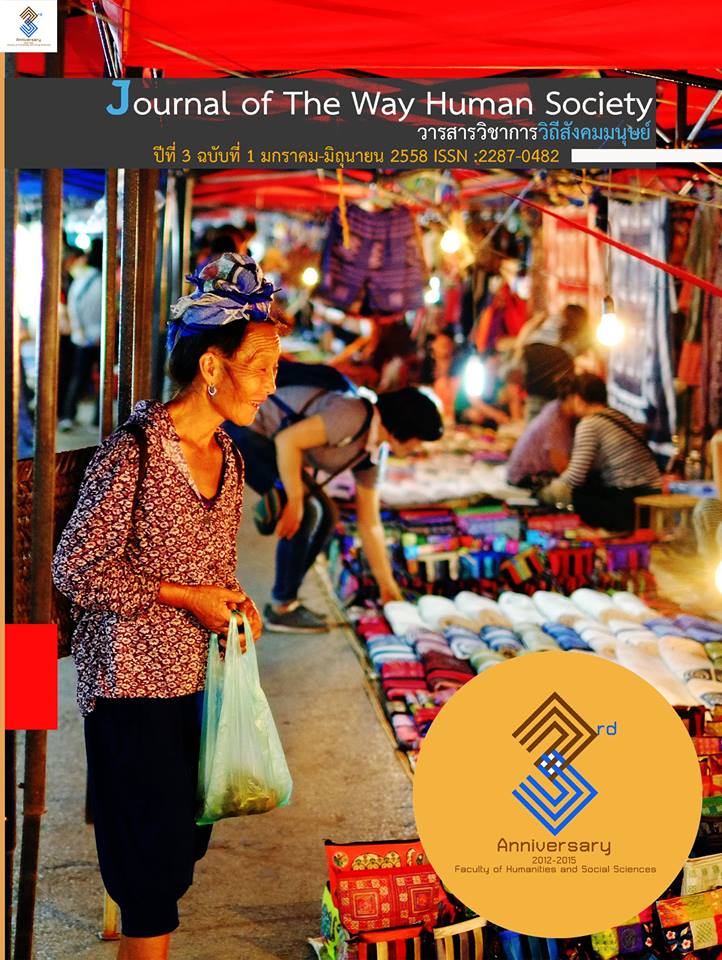การปรับตัวทางสังคมและวัฒนธรรมของชนเผ่าม้งในเมืองหลวงพระบาง สปป.ลาว
คำสำคัญ:
ชนเผ่าม้ง, การปรับตัวทางสังคมและวัฒนธรรม, Hmong tribe, Adaptation of the Social and Cultureบทคัดย่อ
การศึกษาวิจัยในครั้งนี้มีความมุ่งหมายเพื่อศึกษาการปรับตัวทางสังคมและ วัฒนธรรมของชนเผ่าม้งในเมืองหลวงพระบาง สปป.ลาว โดยการศึกษาเอกสารและการ ลงพื้นที่เก็บข้อมูลภาคสนาม จากกลุ่มผู้รู้ ผู้ปฏิบัติ และผู้เกี่ยวข้องในพื้นที่แขวงหลวงพระบาง สปป. ลาว โดยใช้แบบสัมภาษณ์ทั้งชนิดมีโครงสร้างและไม่มีโครงสร้าง แบบสังเกตรวมทั้ง การบันทึกเสียง การถ่ายภาพและการจดบันทึก การนำเสนอผลการวิจัยแบบเชิงพรรณนา วิเคราะห์ผลการวิจัยพบว่า เมืองหลวงพระบางที่เป็นเมืองท่องเที่ยวนั้นได้ก่อให้เกิด ปรากฏการณ์กับคนในพื้นที่และชนเผ่าอย่างชนเผ่าม้ง ชนเผ่าม้งในเมืองหลวงพระบาง ซึ่งในงานวิจัยนี้ผู้วิจัยได้ลงพื้นที่ใน 3 สถานที่ คือ บ้านนาอวน บ้านขัวที่หนึ่ง และตลาด กลางคืน และพบว่า ได้มีการปรับตัวทางสังคมและวัฒนธรรม เพื่อสนับสนุนการท่องเที่ยว และแบ่งการปรับตัวทางสังคมและวัฒนธรรมได้ 3 ด้าน คือ การปรับตัวด้านอาชีพ การปรับตัวด้านความเชื่อ และการปรับตัวด้านทัศนคติที่มีต่อนักท่องเที่ยว 1) การปรับตัว ด้านอาชีพคือ จากเดิมมีการประกอบเกษตรกรรมเป็นอาชีพหลัก ปรับตัวเป็นอาชีพขาย ของที่ระลึกเป็นหลัก 2) การปรับตัวด้านความเชื่อ คือการนำความเชื่อเรื่องผี การนับถือผี มาสู่เย็บเป็นตุ๊กตาผีจำหน่ายเป็นของที่ระลึก ซึ่งจากเดิมนั้นชาวม้งจะเคารพความเชื่อเรื่อง ผีอารักษ์และวิญญาณบรรพบุรุษ การปรับตัวดังกล่าว คือ กระบวนการในการปรับเปลี่ยน ความเชื่อ หรือทัศนคติ ให้เข้ากับสภาพวิถีชีวิต 3) การปรับตัวด้านทัศนคติที่มีต่อนัก ท่องเที่ยว เด็ก ๆ ชาวม้งมีทัศนคติที่ว่าการประกอบอาชีพในเมืองจะได้เงินดีกว่าการทำ เกษตรกรรม รวมทั้งการเรียนรู้ภาษาอังกฤษทำให้มีโอกาสที่ดีกว่าในการประกอบอาชีพ ขายของที่ระลึก การขับรถรับจ้าง รวมไปถึงการเป็นไกด์นำเที่ยว ชาวม้ง มีทัศนคติต่อนัก ท่องเที่ยวในเรื่องของรายได้จากการบริการเช่น ขับรถโดยสาร หรือ สามล้อเครื่อง รวมไป ถึงไกด์นำเที่ยว ให้กับนักท่องเที่ยวซึ่งมีตลอดทั้งปีและในช่วงเทศกาลรายได้จะเพิ่มเป็น หลายเท่าตัว อย่างไรก็ตามการปรับตัวทางสังคมและวัฒนธรรมของชนเผ่าม้ง เกิดจาก นโยบายของทางรัฐบาลมาสนับสนุน ในการสร้างการท่องเที่ยวทางวัฒนธรรม
ดังนั้น สภาพสังคมของชนเผ่าม้งเมืองหลวงพระบาง จากเดิมที่เป็นสังคมแบบ ปิดคือเป็นสังคมชนเผ่า มีโครงสร้างทางสังคมที่มีข้อกำหนดหรือแนวปฏิบัติของตน จนกระทั่งมีตัวแปรเข้ามาคือเรื่องของการท่องเที่ยว ทำให้เกิดการปรับตัวทางสังคมคือการประกอบอาชีพ รายได้ของครอบครัวชนเผ่าม้งนำมาสู่ฐานะทางการเงินที่ไม่เท่าเทียม กันชุมชนนำไปสู่การย้ายถิ่นฐานชาวเมืองหลวงพระบาง และมีการปรับตัวทางวัฒนธรรม คือความเชื่อ ที่สืบสานต่อกันมาจากรุ่นสู่รุ่นก็ได้ถูกกระแสโลกาภิวัตน์ค่อย ๆ ทำให้ความ เชื่อนั้นปรับหรือยืดหยุ่นไปตามบริบทสังคมเมืองท่องเที่ยว ซึ่งอาจกล่าวได้ว่าความเป็นเมือง หลวงพระบางได้ส่งผลให้เกิดการปรับตัวทางสังคมและวัฒนธรรมของชนเผ่าม้ง ซึ่งเป็น ส่วนหนึ่งของกลไกการพัฒนาประเทศสาธารณะรัฐประชาธิปไตยประชาชนลาว
This research aims to study social and culture adaptations of Hmong tribe in Luang Pha Bang, Laos by examining documents and surveying from scholars, operators, and relevant people around the city area of Luang Pha Bang. The researcher adopted interview techniques both structure and non-structure interviews, as well as observations, sound recording, photo taking. The results of the study are emphasized by descriptive analysis. The research results express the impacts of the tourism industry that affects local people and Hmong’s ways of living when Luang Pha Bang city becomes one of the most visited tourist attraction in Laos. The subjects of the study come from three majors target area such as Hmong who lives in Ban Na Oun, Ban Kua I and the night market. This study found that there are several social and culture adaptations appears in the subject lives that be able to divide into three adaptation issues such as jobs, believes and attitude towards tourists. First, the jobs adaptation emphasizes changing of legacy jobs such a farmer to be a souvenir seller instead. Second, believe adaptation, for instance, people transforms their ghost beliefs to souvenir ghost dolls and sells to tourists. Previously, Hmong tribe respects ghosts and ancestral spirits. Such an adaptation encourages signifi cant attitudes or beliefs changing to match the way of life. Third, Hmong tribe adjusts their attitude towards tourists. Hmong children have the new attitude that working in the city will better than agriculture. Moreover, learning English communication might provide better chances to fi nd jobs in the city, for example, become a souvenir seller, a driver, as well as a tour guide. Therefore, they have an attitude towards tourists in terms of revenues from their provided services where an amount number of tourists are increasing especially during the festivals. However, social and cultural adaptations of the Hmong also cause by the government policies that mainly focus their attention on cultural tourism. Thus, the social conditions of Hmong in Luang Pra Bang are changing from a close to an open society. The closed society refers to the tribal society that consists of the social structure with its legacy terms or practical rules. Until the city became a popular tourist attraction, the social adaptations are encouraged, for instance, occupations and family incomes bring fi nancial inequality and lead to a new community relocation to Luang Pra Bang. For culture adaptation, Beliefs—inherited from a generation to a next generation—gradually change and expand themselves to fi t the contexts of tourism social. And it can be said that Luang Pra Bang city has resulted in social and cultural adaptations of the Hmong tribe and these adjustments are parts of the development mechanisms of Laos.



